There is something unique about this downtown apartment. At the entrance you are welcomed by one of the life-size colourful donkeys which were on display during last year’s Caravan exhibition. Inside, all the rooms breathe music, with the posters on the walls bespeaking memorable operatic productions in which Fabrica’s creators performed. The artistic setting is warm, inviting and stimulating, the perfect home for this brainchild of soprano Neveen Allouba’s.
For many the first encounter with Fabrica was when Bassem Youssef hosted the troupe on El Bernameg, the satirical news show, in June 2013. Fabrica singers performed snippets from their latest production Les Miserables, a well-known musical by Claude-Michel Schonberg with an English libretto by Herbert Kretzmer translated to Egyptian Arabic by Sarah Enany. But the history of Fabrica is longer and richer than this appearance, and the troupe’s ambitions go far beyond the performance whose success took them on tour to the USA in January 2014.
“Fabrica was on my mind for several years before it was even established,” Neveen Allouba reveals, recalling her career of many roles. Though her music education began as a pianist, following her graduation from the Cairo Conservatory, Allouba continued her studies in Germany where she shifted to singing. She obtained her doctorate from Hannover’s Hochschule fur Music and Theater where she studied Opera Performance and Vocal Pedagogy. Today Allouba has a large repertoire to her name; she is a staff member of the Cairo Conservatoire, a member of the Cairo Opera Company and an Adjunct Professor of Voice at the American University in Cairo.
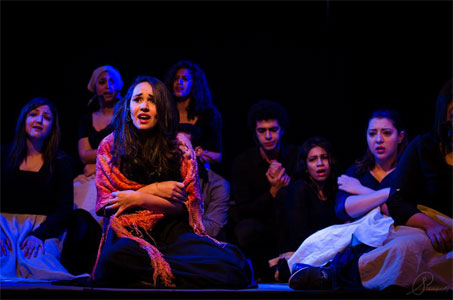
Scene from Les Miserables by Fabrica (photo courtesy: Fabrica)
“In over two decades of teaching singing, I realised that there is a lot of potential among young Egyptians. Only very few have the ability to pursue singing by studying abroad, a few depend on the Trinity Guildhall or London’s Royal College of Music curriculums and exams in Egypt. What those young singers always need however is the actual chance to develop professionally and gain recognition inside Egypt,” Allouba elaborates.
In 2003, she started teaching singing in German schools in Egypt and soon after she was closely involved in the Deutsche Jugend Musiziert Wettbewerb, the German music competition for young people, open to German residents and pupils in German schools abroad. “We managed to place many contestants from Egypt in the competition,” Allouba adds proudly, “and several of them reached the finals.”
While shedding light on young talents, Allouba looks for ways of introducing opera and musicals to a wider audiences; and this, she believes, can be done by presenting such works in Egyptian Arabic. On Allouba’s and Egyptian baritone Raouf Zaidan’s initiative, Mozart’s Magic Flute premiered in Alexandria in 2010 with a libretto first literally translated to Arabic by Allouba and then written by Sarah Enany. Allouba considers The Magic Flute to be the cornerstone of Fabrica for Music Theatre Development. The production was directed by Mohamed Abou Elkheir and featured established singers alongside young and emerging talents.
By the time The Magic Flute was performed, Allouba was already teaching at the American University in Cairo (AUC) in its music minor department then in the major music performance department launched in 2011. The department became the perfect platform for her to combine her teaching with plans for Fabrica. “When the revolution happened in early 2011, the first work that came to my mind was the musical Les Miserables,” Allouba explains.
“Set within the historical context of the French Revolution, Les Miserables fits the current reality in Egypt like no other musical. In this new production, Fabrica brings a new version of the work to the Egyptian audiences: in Egyptian Arabic, with historical references that reveal much of the actual socio-political turmoil Egypt is currently witnessing,” we read at Fabrica’s website.
Allouba adds that she wanted the musical to be part of the graduation project of Nesma Mahgoub, the first student to graduate with a music major from AUC, and the winner of the 8th Star Academy Arab World competition.
“Sarah Enany translated the text to Egyptian Arabic and Mohamed Abou Elkheir directed the production. Creating this musical within the university walls was a good option for many reasons. We needed someone to produce it, at minimal costs, and with very a basic set. We gathered music department students and other good voices at the university interested in joining the production, then we launched auditions which brought students from the German University in Cairo and Cairo University and other young people along.”
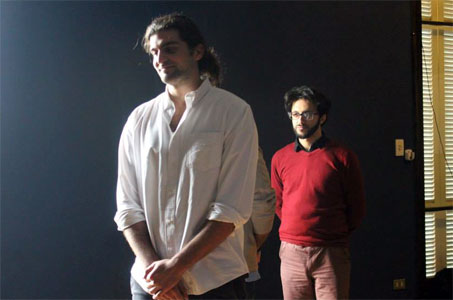
Acting class at the Fabrica studio (Photo courtesy: Fabrica)
Allouba stresses that finding a suitable voice for Jean Valjean, a role that requires a high baritone, was among her greatest concerns. She was finally relieved when Mahgoub introduced her to a young Egyptian singer and songwriter from EgoZ band, Hany Mustafa, who fit the role perfectly and whom Allouba describes as “a very talented singer and interested to work in musical theatre.”
Les Miserables in Egyptian Arabic premiered in May 2013, with Bassem Youssef giving it an additional boost. The musical toured the USA in January this year and was re-performed at El Sawy Culturewheel in Cairo. “Due to limited funds, we managed to take only 12 cast members with us to the USA and many actors had to play several roles. We performed in a few universities and schools across the country where we were very well received, particularly by the Egyptian community of Boston. It was also in Boston that we were joined by over 100 choir singers from the music department. In New York, we were hosted by a community theatre on Broadway, and we performed for 10 minutes at the opening ceremony of Vermont’s new Senate season,” Allouba enumerates a few of Fabrica’s US appearances.
As Fabrica gains momentum, Allouba takes the project further. Sitting in one of the Fabrica studio rooms downtown, she holds forth. “This is Raouf Zaidan’s apartment, which we rent and which we renovated a little. Not only is Zaidan one of the pillars of Fabrica, he has also been supporting us all way through, believing that Fabrica is an important platform where young talents will learn and flourish. Today, Fabrica works with 60 singers, mostly in their 20s, who were chosen from over 300 candidates through auditions. Many of Egypt’s good voices come from church choirs,” Allouba notes. Once they join Fabrica, she explains, they are trained, provided with vocal and theatre classes.
“We look into their strengths and development needs; we teach them how to read music. Together with Raouf and other artists on board we strongly believe in Fabrica and all the talents. We have a great backbone of high professionals such as Sarah Enany as translator and Mohamed Abou Elkheir as theatre director, among others.”
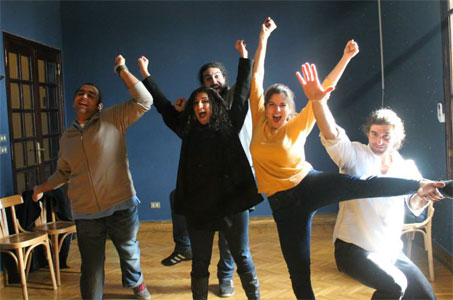
Acting class at the Fabrica studio (Photo courtesy: Fabrica)
Fabrica’s plans include shows that will be based on international operettas and celebrated musicals translated to Egyptian Arabic. Zaidan is thinking about something from Gilbert and Sullivan that he hopes to stage by September this year. On the one hand, Allouba’s thoughts take her to one of the short operas composed by Egyptian composer and conductor Sherif Mohie El Din, and on the other hand she points to a bigger musical venture: Bernstein’s West Side Story.
“I already spoke with Enany about this musical. It is challenging yet very feasible if people are trained well as actors and singers. Moreover, in this production we will need to collaborate with dancers. Enany is still thinking how to draw from the thematic content of this musical and place it in an Egyptian context, what choices to make when creating two camps which compete and fight with one another.”
The newly established Fabrica studio is already providing music training facilities to other institutions. Among its current projects is cooperation with Goethe Institute to provide training to music teachers working in public schools. Currently Fabrica works with eight such schools focusing on educating teachers on how to approach children aged seven-13, how to train them and strengthen their singing skills.
Still, in its first year, Fabrica’s studio must overcome many challenges before it can fulfil the dreams of its creators. With students creating an inspiring creative commotion, understandably the company is still barely covering its own expenses. It might be easier to find enthusiastic young people looking to train their singing and theatrical skills than convince sponsors that Fabrica’s work will leave an important imprint on the young generation.
As such not only does Fabrica aim at introducing valuable musical and operatic productions to wide audiences, reaching out to the Egyptians by adapting to their language and realities, it is also reshaping minds and developing a new culture of believing in and nurturing this art. Such a process will take years to accomplish yet its first fruits might be very close at hand, and the evidence is there in the success of Les Miserables. Allouba’s dream is to find her backbone in a producer that will provide a theatre with all the necessary facilities, but taking into account her dynamism and faith, those wishes might come true sooner than she expects.
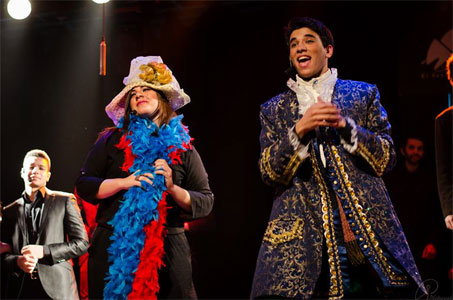
Scene from Les Miserables by Fabrica (Photo courtesy: Fabrica)
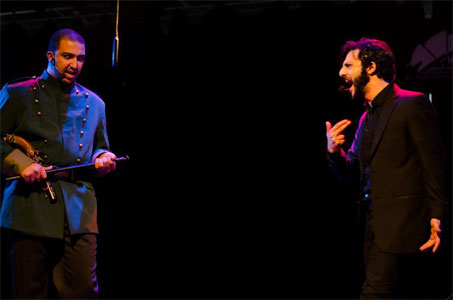
Scene from Les Miserables by Fabrica (Photo courtesy: Fabrica)
This article was originally published in Al Ahram Weekly
Short link: